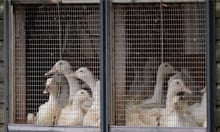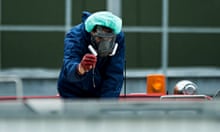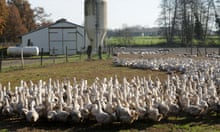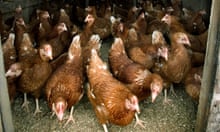The government is taking an outbreak of avian flu in Yorkshire “very seriously” but festive shoppers should not worry about contracting the disease from turkeys, the environment secretary, Elizabeth Truss, told the Commons on Monday.
She confirmed that the outbreak at a farm near Driffield, East Yorkshire, was of the “highly pathogenic H5 strain of avian flu”, but it is not H5N1, which has caused intermittent worldwide alarm and can often be fatal if caught by humans. About 6,000 ducks will be killed on the farm, which has been ringed by a six mile surveillance zone.
“We are at the early stage of examining what strain this is,” Truss said. “We will know more in the coming days.” She said inquiries will seek to establish if the outbreak is linked to cases of a highly contagious strain in chickens in the Netherlands and Germany. “We are looking at the migratory patterns of wild birds, which could be one of the factors [in bringing the virus to Yorkshire],” she said.
The chief medical officer and Public Health England have assessed the risk to human health as “extremely low”. “It does not pose a food safety risk to UK consumers and the Food Standards Agency has been absolutely clear about that,” Truss said.
Gary Lavis, chair of the parish council in the village of Nafferton, said the problem was first noticed about a week ago when egg production started falling and birds began dying in greater numbers than usual.
A private vet raised the alarm on Friday morning and a government vet visited the farm later that day and immediately sent samples to the Animal and Plant Health Agency (APHA) laboratory in Weybridge, Surrey. Scientists identified the virus as an H5 type on Saturday evening.
Dutch authorities said on Sunday that the H5N8 strain, which has never been detected in humans but has caused the mass slaughter of birds in Asia, had been found among chickens at an egg farm in the village of Hekendorp in the central Netherlands.
It is the first serious UK case of bird flu since 2008, when the H7N7 strain was found in free range laying hens near Banbury, Oxfordshire.
The Yorkshire duck farm is run by the Lincolnshire-based food company Cherry Valley, which describes itself as “your one stop shop for all your duck needs”. John Vernam, the firm’s head of UK operations, said culling and disinfection would take place under the direction of the Department for Environment, Food and Rural Affairs (Defra) and the APHA. As well as the surveillance zone there was also a two mile protection zone around the farm.
Defra said: “We have a strong track record of controlling and eliminating previous outbreaks of avian flu in the UK.”
The UK’s chief veterinary officer, Nigel Gibbens, told the BBC the bird flu in the Netherlands was “our most likely source” for the Yorkshire outbreak, which was in part why there was minimal fear for human health.
He said: “The people dealing with the birds directly, that’s the highest risk, and we’ll be working to make sure they’re protected with proper hygiene precautions as they’re handling the birds. The main focus is to protect our bird flock rather than any risk to public health.”
In the Netherlands, the destruction of 150,000 hens and disinfection of their holding areas has begun, with Dutch authorities announcing a 72-hour standstill in all exports of meat and eggs from chickens on the infected farm. So far no crossover transmission of the virus between animals and humans has been reported, and two farms have already been given a clean bill of health, according to the Dutch media.
“We can only call on all farmers to abide by these rules and respect the security zone,” a Dutch diplomat said. “We are following all the rules in the regulatory framework. Let’s just hope for the best. I don’t think there is any link with outbreaks in any other country, but it is not for us to say. That would be a bit presumptuous.”
On Monday night the European commission announced emergency measures to contain the outbreaks. A commission spokesman said in a statement: “The measures aim at quickly bringing the disease under control and at preventing the spread of the highly pathogenic avian influenza within the affected member states, to other member states and to third countries while minimising the disturbance to trade.
“The measures include the culling of the poultry on the affected holding, the establishment of protection and surveillance zones, the introduction of sanitary measures (cleaning and disinfection), the prohibition of movements to sell live poultry, eggs, poultry meat and other poultry products to other EU countries and non-EU countries and the culling of affected flocks only in the restricted zones.
“The commission is also informing other EU member states and non-EU countries, as well as international organisations, about the disease situation and on the measures taken.”










Comments (…)
Sign in or create your Guardian account to join the discussion